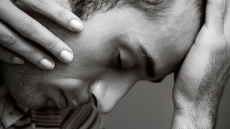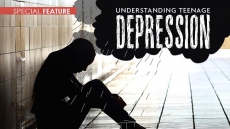Whether or not we acknowledge the noise, each day our ears are exposed to thousands of different sounds. Tuning people out or turning down the volume may sound like an easy solution when the noise is too much, but, for those suffering from hearing loss, the challenge instead is in wanting to hear more.
WHAT IS HEARING LOSS?
Hearing loss is the inability, or decrease in ability, of the ear to detect sounds and the brain to interpret such sounds. When one or more parts of the ear encounter a problem, the ability to process and transmit sound to the brain is disrupted. It’s a complex concern for more than 10 percent of the world’s population with some form of hearing loss.
Hearing loss can be categorized into two types, conductive or sensorineural, based on what part of the auditory system is affected. “You could be born with either, or you could acquire them at any time in life,” explains Marilyn O. Dahl, president of the Canadian Hard of Hearing Association – BC Chapter.
When hearing loss occurs as a result of an impediment to the outer and middle ear, it is classified as conductive. The outer ear is unable to conduct sounds to the inner ear which results in a reduction of sound intensity. The cause can often be identified – wax in the ear canal, a hole in the eardrum – and therefore treated in a way that results in a partial improvement in hearing.
“Sensorineural hearing loss is a problem with the generation and/or transmission of sound from the inner ear to the brain. That is, nerve damage,” says Dahl. The intensity of sound is reduced along with the possibility of sound distortion, making sounds more difficult to hear as well as process, despite their volume. The reason this type of hearing loss occurs is often undetermined, inherited or found to be irreversible, making treatment difficult.
Individuals may also experience a combination of these two types, referred to as mixed hearing loss.
HOW IS IT DIAGNOSED?
In its earliest stage, a loss of hearing and the need of medical intervention can be hard to gauge. Warning signs include constantly having to turn up the volume on the TV or radio, difficulty using the phone, thinking others are always mumbling, asking others to repeat themselves regularly, and confusion over the directionality of sounds. If any of these signs are a part of your everyday struggles to hear, visiting your family physician is essential.
“The front line professional providing service to someone with a hearing loss is the audiologist, who tests hearing and recommends a suitable hearing device,” says Dahl. “But before visiting an audiologist, one should see their own medical doctor, who will determine whether there seems to be a medical condition causing the hearing loss. They will refer one to the ear specialist, who in turn sends on to the audiologist.”
A doctor will be able to classify your hearing loss by degree, ranging from mild, where background noises become hard to decipher, to profound, where the use of a hearing aid would be essential to understand speech. The correct diagnosis will allow for personalized treatment or management strategies.

WHAT CAUSES HEARING LOSS?
Hearing loss doesn’t occur just because we age or attend too many rock concerts. While these factors undoubtedly affect how well we interpret sounds, there are several reasons why a person may lose their hearing.
Hearing loss can be inherited, passed on through both recessive and dominant genes. About 50 to 60 percent of hearing loss in babies is a result of genetics.
While it may seem unrelated, several diseases, including mumps, meningitis, and fetal alcohol syndrome, can contribute to hearing loss. Illnesses such as heart disease and diabetes that interfere with the blood supply of the ear can also result in a loss of hearing.
Ear infections or buildup of ear wax can cause hearing loss as a result of blocked ear canals. “Head injury, brain tumors, anything which blocks the flow of blood to nerves serving the ear, such as a stroke, can often result in loss of hearing,” says Dahl.
Certain medications have been known to contribute to a loss of hearing due to the irreversible damage they cause to the ear. “There are some drugs which, given in large doses such as certain antibiotics, or for high blood pressure, may cause hearing loss or make an existing hearing loss more severe,” says Dahl. “Addictive drugs such as cocaine and heroin also result in hearing damage, from long term use or excessive dosages.”
Unfortunately for lovers of loud music or those working around heavy machinery, our environment can have a negative impact on hearing. “At present, the major cause of acquired hearing loss in our society is noise, or, in other words, loud sound,” Dahl says.
Workers in industries such as carpentry, plumbing, mining, manufacturing and transportation all report some degree of hearing loss. “The use of headphones to transmit music played much too loud are a main culprit in the increase of hearing loss in the young,” cautions Dahl. A growing problem in the age of increased technology puts our hearing at risk as loud noise can cause enough force within our ears to damage our auditory systems.
And lastly, old age, the most common cause, can decrease our ability to hear. Why our hearing deteriorates is still not fully understood by researchers but it is often attributed to the amount of noise and other damaging factors we are exposed to over our lifetime that slowly wear down the ear’s inner workings.

CAN IT BE TREATED?
Hearing loss isn’t a curable condition. There are coping strategies and techniques to lessen the losses and available treatments often ease one’s ability to interact and communicate with others but rarely can the effects be reversed.
“In some cases of conductive hearing loss, such as a blockage of some sort to the passage of sound vibrations through the ear, it may be possible to remove something such as ear wax, or foreign objects. Surgical intervention may reverse a conductive hearing loss in the middle ear,” explains Dahl. “Sensorineural hearing loss cannot be reversed, but it can be treated. Great strides have been made – for example, with cochlear implants – to partially restore the ability to hear.”
“Getting a hearing device is not going to cure the hearing loss, but it can help one to hear better,” says Dahl. It simply amplifies sounds in order to aid in the hearing process.
“It requires practice, perseverance, and being educated in the use of the device, and other assistive technology, for one to become competent in its use. It also requires the use of various coping strategies and explaining to others how to communicate in a facilitative manner, in order for one to understand,” she continues.
If left unmanaged, hearing loss can have a profound impact on one’s education, employment and social interaction. It is important to have any concerns addressed as soon as possible, especially for children, so strategies can be put in place to ensure quality of life is not negatively impacted.
“To delay loss of hearing, there is lots which can be done,” Dahl says. “Lead a healthy lifestyle. Protect your hearing.” And not just by turning down the volume on your own TV but also challenging loud environments in which we’re exposed to high levels of noise.
Hearing isn’t something we think about much until we can’t do it. While not always treatable, hearing loss can be preventable. Listen to what your body may be telling you so you can listen to the world around you.






